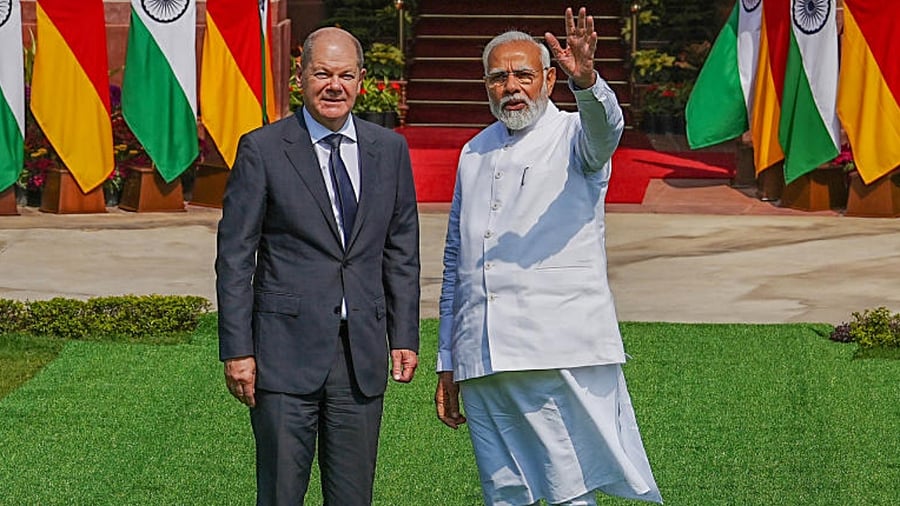
Germany on Saturday subtly nudged India to take a clear stand at the United Nations on Russia’s “special military operations” in Ukraine.
After New Delhi earlier this week once again abstained on voting at the United Nations General Assembly on a resolution that asked Russia to withdraw its troops from Ukraine, Prime Minister Narendra Modi hosted German Chancellor Olaf Scholz here on Saturday and told him that India was “ready to contribute to any peace-process” to end the conflict.
Scholz, however, subtly sent out a message to Modi, stressing on the importance of taking a ‘clear stand’ at the United Nations on Russia’s military aggression against Ukraine.
As Modi hosted Scholz in Hyderabad House in New Delhi, the Russia-Ukraine conflict featured “fairly extensively” in the talks between the two leaders, Foreign Secretary Vinay Mohan Kwatra later told journalists.
Russia’s “war of aggression” against Ukraine brought about a “catastrophe” with terrible consequences for the whole world, Scholz said as he and Modi addressed media-persons after holding talks. He referred to the destruction of energy grids and other infrastructure in Ukraine due to the invasion by Russia. He also noted that the global food and energy crises caused by the conflict had hit the developing countries hard.
“But above all, it is a disaster, a catastrophe because we know this war violates a fundamental principle to which we had all agreed for such a long time, and that is that you do not change borders through the use of violence,” said the German Chancellor, adding: “Thus, it is important that in the United Nations too, we time and again state very clearly where we stand on this issue.”
Modi, however, said that India had insisted on resolving the Russia-Ukraine dispute through dialogue and diplomacy since the beginning of the row.
Brushing aside pleas, not only from Kyiv, but also from Paris, Berlin and other western capitals as well as the European Union, New Delhi earlier this week refrained from supporting a resolution that the United Nations General Assembly adopted to mark a year of Russia’s “special military operations” in Ukraine. The resolution called for cessation of hostilities and withdrawal of Russia’s military forces from the territory within the internationally recognized borders of Ukraine. It was adopted by the UN General Assembly, with 141 nations voting in its favour and seven against it. India joined Pakistan, China and 29 other nations to abstain from voting on it.
Scholz also tacitly conveyed that Germany would expect India to use its G20 presidency to end the Russia-Ukraine conflict. “It is good that #India holds the #G20 Presidency in these challenging times. Russia's war of aggression on Ukraine has terrible consequences for Ukraine. And dire effects on the whole world. Together we are working to stop the war,” the German Chancellor posted on Twitter after his meeting with the Prime Minister.
New Delhi, however, sought to play down Scholz’s subtle message for India to take a “clear stand” on the conflict at the United Nations. “It was the Indian Prime Minister who openly stated in Samarkand (in September 2022) that this is not the era for war. In the discussion (between the Prime Minister and German Chancellor on Saturday), I would say, I only saw understanding and appreciation of each other's perspective,” Foreign Secretary told journalists later.
India had earlier abstained from voting on five resolutions the UNGA adopted condemning Russia for its military aggressions against Ukraine. It had in October 2022 voted against Russia, rejecting the former Soviet Union nation’s demand for a secret ballot on a proposed resolution that condemned President Vladimir Putin’s move to annex four regions in Ukraine. It had, however , abstained from voting on the resolution.
Besides, during its tenure as a non-permanent member of the Security Council from January 2021 to December 2022, India had also abstained from most of the resolutions targeted against Russia. It had, however, in August 2022 joined the US and 11 other nations to vote against Russia and allow Ukrainian President Volodymyr Zelenskyy to virtually address the Security Council.
New Delhi has been drawing flak for not joining the western nations in strongly condemning Moscow’s aggression against the East European nation. India refrained from echoing the US and rest of the West primarily in view of its decades-old strategic partnership with Russia and its continued reliance on military hardware procured from the former Soviet Union nation. India has been circumventing sanctions imposed by the US and the other western nations on Russia and continuing bilateral trade. It has also increased oil and coal imports from Russia.

